Code completion
Configure: Settings | Editor | General | Code Completion
For automatic completion, enable the Show suggestions as you type option.
Basic completion: CtrlSpace
To reject all suggestions, press Esc.
Basic code completion helps you complete names, types, and keywords within the visibility scope.
CLion analyzes the context and suggests the choices that are reachable from the current caret position. Suggestions also include Live templates. Completion is available for a non-English keyboard layout.
By default, CLion displays the code completion popup automatically as you type.
Alternatively, you can press CtrlSpace or select Code | Code Completion | Basic from the main menu.
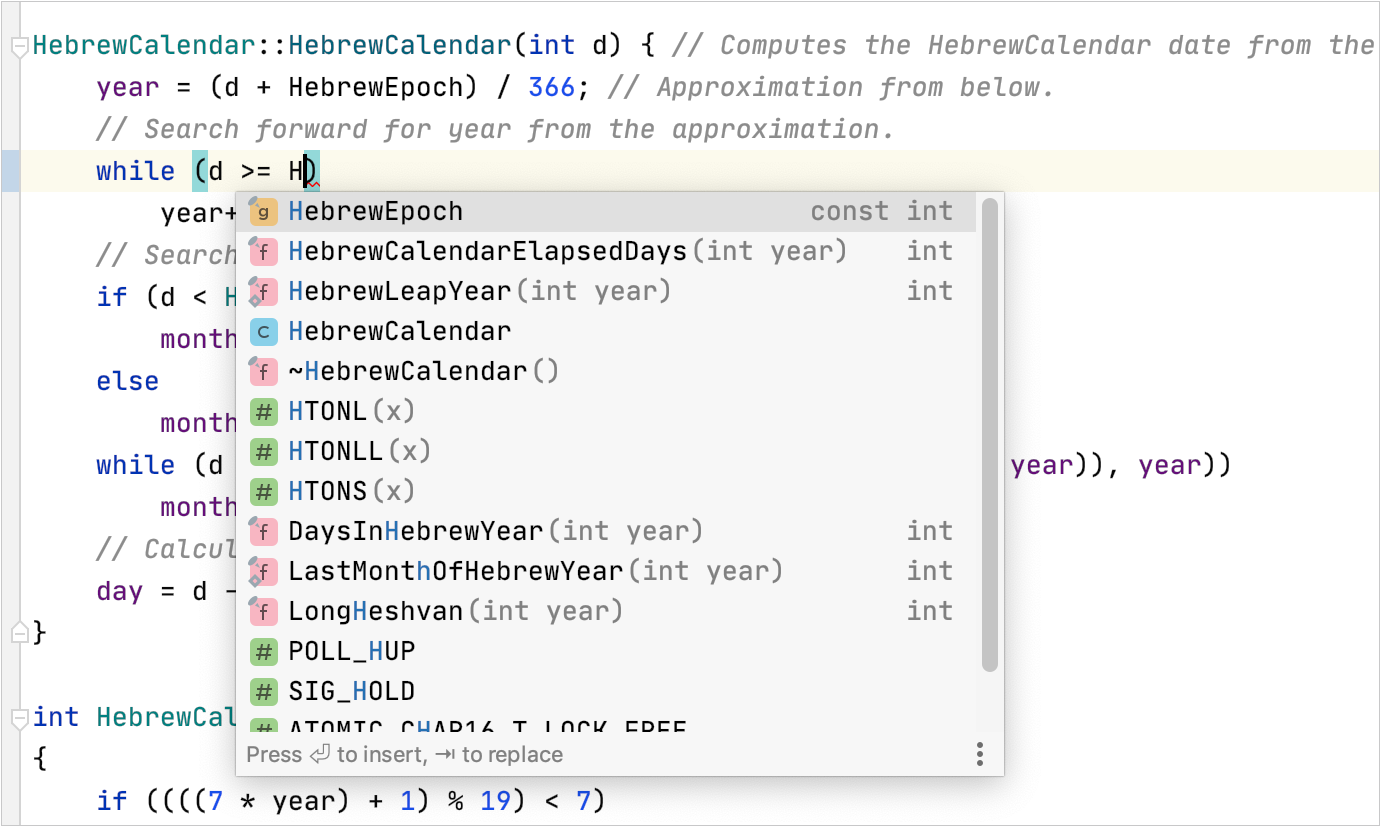
Code completion is available for custom file types. However, CLion does not recognize the structure of such files and suggests options regardless of whether they are appropriate in the current context.
Press Enter or double-click the relevant list item to insert it to the left of the caret.
Press Tab to replace the characters to the right from the caret.
Use CtrlShiftEnter to make the current code construct syntactically correct (balance parentheses, add missing braces and semicolons, and so on).
Use specific keys and custom characters to accept the selected completion suggestion. To enable these features, go to the Editor | General | Code Completion settings page CtrlAlt0S and do the following:
To use specific keys, select the Insert selected suggestion by pressing space, dot, or other context-dependent keys checkbox. These keys depend on the language, your context, and so on.
To also use custom characters, enter the characters into the Additional characters to accept the completion field.
note
While this setting helps you save time, turning it on may result in items being inserted accidentally.
Smart type-matching code completion filters the suggestion list and shows only the types applicable to the current context.
To invoke type-matching completion, start typing and press CtrlShiftSpace or select Code | Code Completion | Type-Matching from the main menu.
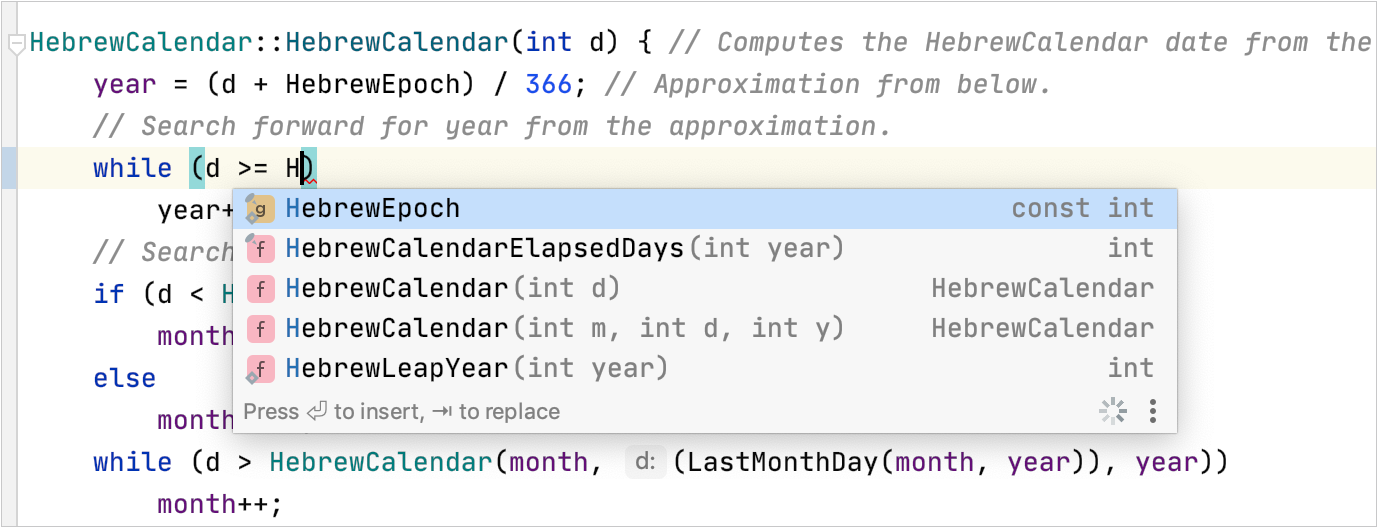
You can create syntactically correct code constructs by using statement completion. It inserts the necessary syntax elements (parentheses, braces, and semicolons) and gets you in a position where you can start typing the next statement. To invoke statement completion, start typing a code construct and press CtrlShiftEnter.
Complete Statement works with the following language constructs:
Type and type members: classes, namespaces, and enums.
Statements:
if/else,while,do,for,switch/case,try/catch.
Start typing a code construct and press CtrlShiftEnter.
CLion automatically completes the construct and adds the required punctuation. The caret is placed at the next editing position.
Use case
Before Complete Statement
After Complete Statement
Class declaration
class NewClass /*caret*/class NewClass { /*caret*/ };switchclauseswitch/*caret*/switch (/*caret*/) {}switch (i /*caret*/) {}switch (i) { /*caret*/ }whilestatementwhile/*caret*/while (/*caret*/) {}while (n > 0/*caret*/) {}while (n > 0) { /*caret*/ }ifstatementif /*caret*/if (/*caret*/) {}if (n > 0/*caret*/) {}if (n > 0) { /*caret*/ }forstatementfor /*caret*/for (/*caret*/) {}for (int i = 0; i < 10; ++i/*caret*/) {}for (int i = 0; < 10; ++i) { /*caret*/ }Try-catch statement
try /*caret*/try { /*caret*/ }catch /*caret*/catch (/*caret*/) { }catch (const std::exception/*caret*/) {}catch (const std::exception) { /*caret*/ }
Hippie completion is a completion engine that analyses your text in the visible scope and generates suggestions from the current context. It helps you complete any word from any of the currently opened files.
Type the initial string and do one of the following:
Press Alt0/ or choose Code | Code Completion | Cyclic Expand Word to search for matching words before the caret.
Press AltShift0/ or choose Code | Code Completion | Cyclic Expand Word (Backward) to search for matching words after the caret and in other open files.
The first suggested value appears, and the prototype is highlighted in the source code.

Accept the suggestion or hold the Alt key and keep pressing 0\ until you find the word you need.
CLion allows you to prioritize completion suggestions based on choices that other users made in similar situations.
The ML completion mechanism does not add any new elements but orders the elements retrieved from code. Data is not exposed anywhere; it is collected locally.
Press CtrlAlt0S to open settings and select Editor | General | Code Completion.
Under Machine Learning-Assisted Completion, enable the Sort completion suggestions based on machine learning option and select the languages for which you want to use the ML completion.

Press CtrlAlt0S to open settings and select Editor | General | Code Completion.
Enable the following options:
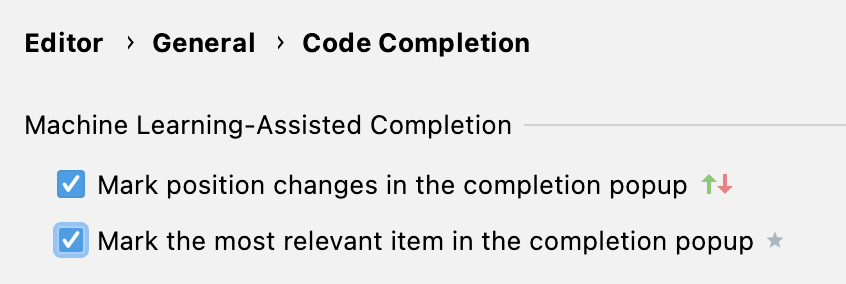
Mark position changes in the completion popup: use the
and
icons to indicate whether the relevance of a suggestion is increasing or decreasing and therefore the suggestion has moved up or down the suggestion list.
Mark the most relevant item in the completion popup: use the
icon to indicate the most suitable suggestion on the list.
The suggestion list will look as follows with the icons marking reordered and the most relevant items.

To configure code completion options, go to the Editor | General | Code Completion settings page CtrlAlt0S.
You can choose the following settings:
Item | Description | |
|---|---|---|
Match case | Select if you want the letter case to be taken into account for completion suggestions. Choose whether you want to match the case for the first letter or for all letters. | |
Automatically insert single suggestions for | Automatically complete code if there's just one suggestion for basic and smart type-matching completion. | |
Sort suggestions alphabetically | Select if you want to sort items in the suggestion list in the alphabetical order instead of sorting them by relevance. You can change this behavior at any time by clicking | |
Show suggestions as you type | Select if you want the suggestion list to be invoked automatically, without having to call completion explicitly. This option is enabled by default. | |
Show the documentation popup in | Select to automatically show a popup for each item in the suggestion list with the documentation for the class, method, or field currently highlighted in the lookup list. In the field to the right, specify the delay (in milliseconds), after which the popup should appear. | |
Insert parentheses automatically when applicable | If this option is enabled, CLion automatically inserts a pair of opening and closing parentheses when you complete a function/method. Clear the checkbox to suppress inserting parentheses automatically. If you use an opening parentheses To use an opening parentheses For more information, refer to Use specific keys to insert suggestions. | |
Show import items in basic completion
| When a symbol that you want to use is not imported in the current file with the corresponding You can use this option to include import symbol suggestions into the suggestion lists of automatic and basic completion. | |
Behavior of import items
| Configure the import completion behavior to always insert an | |
Show free functions in members completion
| One common C++ coding practice is to prefer non-member non-friend functions to member functions. This is a great way to increase encapsulation and keep class interfaces as minimal as possible. When you type a dot Clear this checkbox if you do not want to have free functions in the completion suggestions. | |
Machine Learning-Assisted Completion | ||
Sort completion suggestions based on machine learning | Select this option if you want to use machine learning models to rank the most suitable items higher in the suggestion list. Select the languages for which you want to enable suggestions based on machine learning. | |
Mark position changes in the completion popup | Use the | |
Mark the most relevant item in the completion popup | Use the | |
JavaScript | ||
Only type-based completion | By default, CLion suggests completion for symbols regardless of their types. With this approach, in complicated cases the list shows multiple completion variants. To make completion more precise, select this option. The completion list will strongly depend on the CLion inference. As a result, the list may remain empty in case of poor inference. | |
Suggest items with optional chaining for nullable types | By default, CLion suggests completion for symbols with the optional chaining operator (?). Clear this checkbox to suppress this behavior. | |
Expand method bodies in completion for overrides | By default, when you want to override a method from the parent class or interface and select this method from the list of completion suggestions, CLion automatically adds parameters, generates a Clear this checkbox to suppress automatic generation of method bodies for overrides during completion. | |
Completion of names |
| |
Parameter Info | ||
Show the parameter info popup (in ms) | Select this checkbox to have CLion automatically show a popup with all available method signatures when an opening bracket is typed in the editor, or a method is selected from the suggestion list. In the text field to the right, specify the delay (in milliseconds) after when the popup window should appear. If this checkbox is not selected, use Ctrl0P to show parameter info. | |
Show full method signatures | If this checkbox is selected, the parameter info displays full signatures, including method name and returned type. | |
SQL | ||
Suggest objects from | Select where the objects are suggested from:
The current path only The current scope All schemas    | |
Qualify objects with | Select when to qualify the objects with databases, schemas, tables and views, and aliases of tables and views. Table/View: Always Table/View: Never   | |
Qualify objects in | Select when to qualify the objects in the given cases. JOIN completion: Always JOIN completion: Never   | |
Use aliases in completion for JOIN | Creates aliases for tables in the  | |
Invert order of operands in auto-generated ON clause | Switches operands in the  | |
Suggest non-strict foreign keys based on the name matching | Generates you a list of possible code completion suggestions for Read more about debugging rules for this option in Debug rules for virtual foreign keys. Checkbox selected Checkbox cleared   | |
Automatically add aliases when completing table names | Creates an alias for a table name.  | |
Suggest alias names in completion after table names | Suggests an alias for a table name when you use code completion (CtrlSpace).  | |
Custom aliases (table) | You can add a table name and the alias that you want to use for this table. To add the table-alias pair, click the Add alias button ( | |
Narrow down the suggestion list by typing any part of a word (even characters from somewhere in the middle) or invoking code completion after a dot separator .
CLion displays suggestions containing the characters you've entered, regardless of their position. This makes the use of wildcards unnecessary.
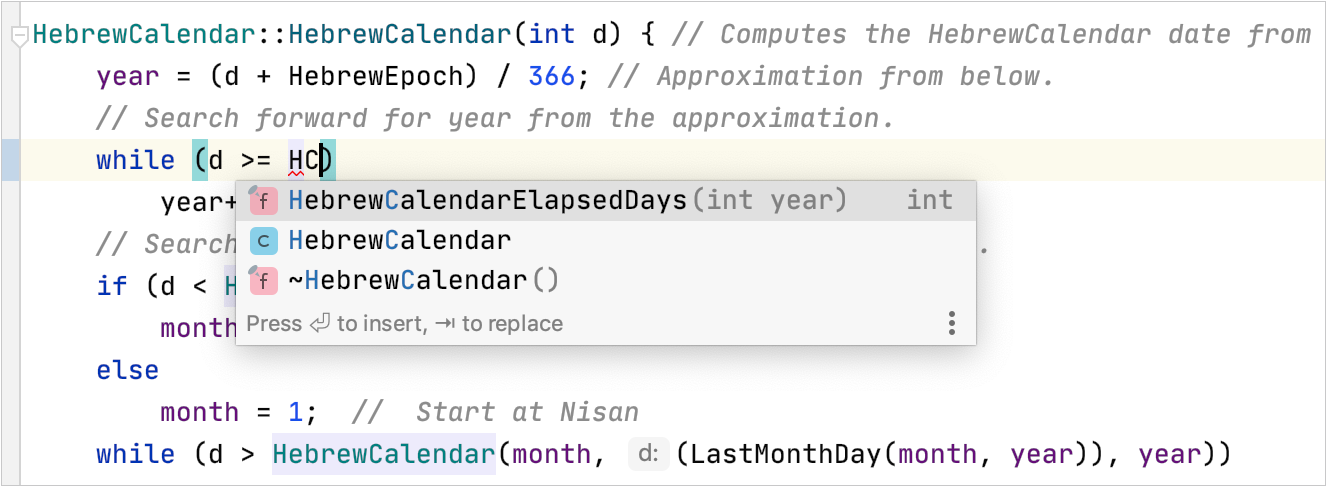
In case of CamelCase or snake_case names, type the initial letters only. CLion automatically recognizes and matches the initial letters.
You can use the by pressing CtrlShift0I when you select an entry in the suggestion list:
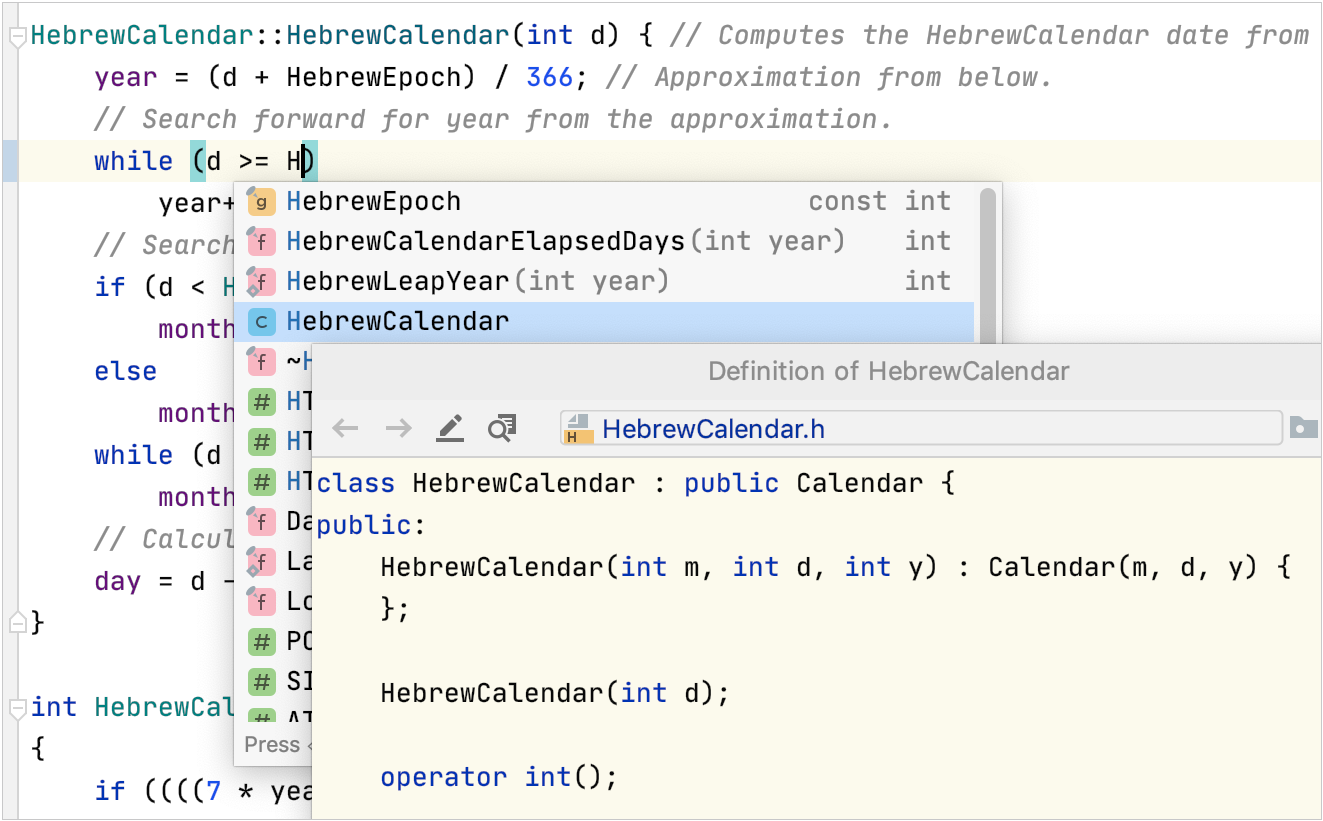
You can use the Quick Documentation view by pressing Ctrl0Q when you select an entry in the suggestion list:

You can view code hierarchies when you've selected an entry from the suggestion list:
Ctrl0H: view type hierarchy
CtrlAlt0H: view call hierarchy.
If code completion doesn't work, this may be due to one of the following reasons:
The Power Save Mode is on (File | Power Save Mode). Turning it on minimizes power consumption of your laptop by eliminating the background operations, including error highlighting, on-the-fly inspections, and code completion.
Your file does not reside in a content root , so it does not get the required class definitions and resources needed for code completion.
A file with the symbols that you want to appear in completion is excluded from indexing.
Code completion popup might not appear automatically if it takes too long to gather the completion options. For example, if the computer is busy with another task. In this case, you may still activate the completion popup manually via CtrlSpace.
Thanks for your feedback!